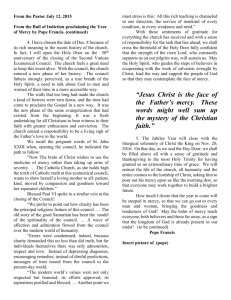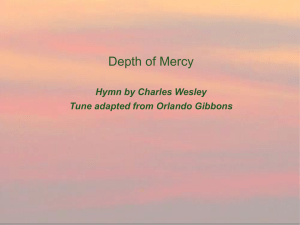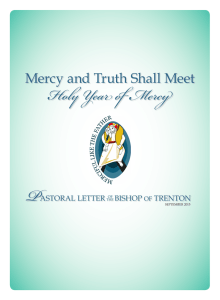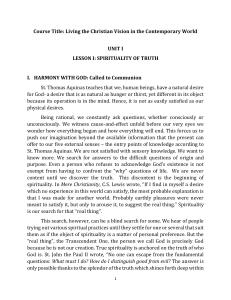Homily - Chapel of the Resurrection – Feb. 18, 2011 –... Over my past four years at Valpo, I have come... campus. With the Peace and Social Justice Symposium, study...
advertisement
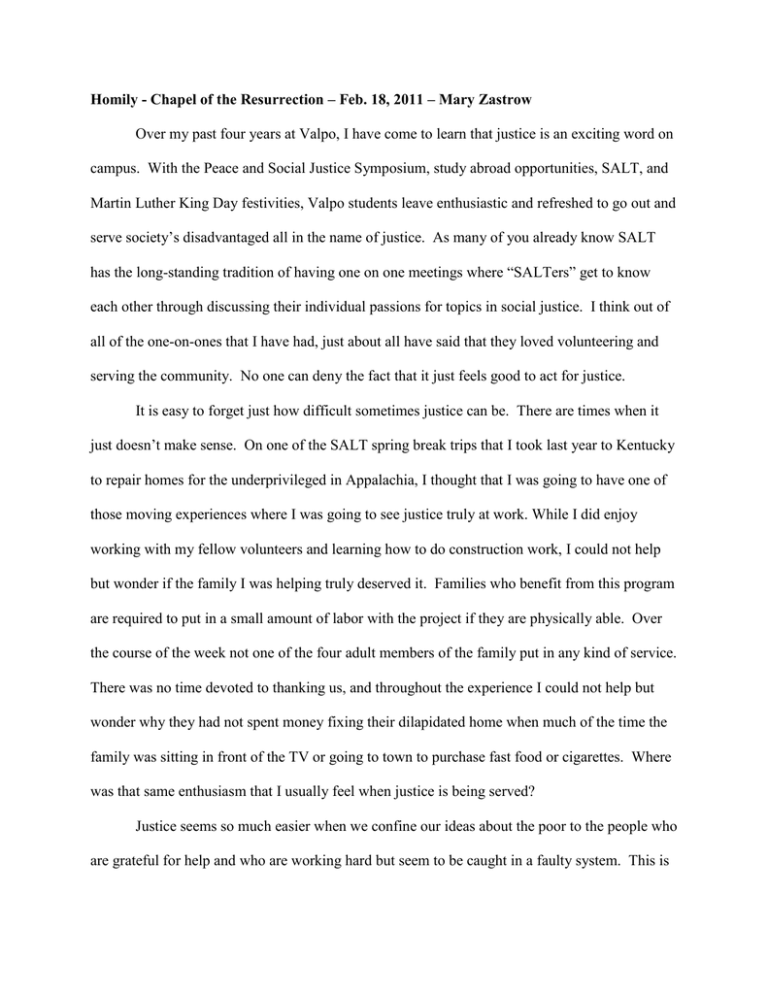
Homily - Chapel of the Resurrection – Feb. 18, 2011 – Mary Zastrow Over my past four years at Valpo, I have come to learn that justice is an exciting word on campus. With the Peace and Social Justice Symposium, study abroad opportunities, SALT, and Martin Luther King Day festivities, Valpo students leave enthusiastic and refreshed to go out and serve society’s disadvantaged all in the name of justice. As many of you already know SALT has the long-standing tradition of having one on one meetings where “SALTers” get to know each other through discussing their individual passions for topics in social justice. I think out of all of the one-on-ones that I have had, just about all have said that they loved volunteering and serving the community. No one can deny the fact that it just feels good to act for justice. It is easy to forget just how difficult sometimes justice can be. There are times when it just doesn’t make sense. On one of the SALT spring break trips that I took last year to Kentucky to repair homes for the underprivileged in Appalachia, I thought that I was going to have one of those moving experiences where I was going to see justice truly at work. While I did enjoy working with my fellow volunteers and learning how to do construction work, I could not help but wonder if the family I was helping truly deserved it. Families who benefit from this program are required to put in a small amount of labor with the project if they are physically able. Over the course of the week not one of the four adult members of the family put in any kind of service. There was no time devoted to thanking us, and throughout the experience I could not help but wonder why they had not spent money fixing their dilapidated home when much of the time the family was sitting in front of the TV or going to town to purchase fast food or cigarettes. Where was that same enthusiasm that I usually feel when justice is being served? Justice seems so much easier when we confine our ideas about the poor to the people who are grateful for help and who are working hard but seem to be caught in a faulty system. This is an especially American view, which teaches that it is everyone’s personal responsibility to help themselves. When we are confronted with people who do not fit this mold, justice just doesn’t make sense. Justice is for those who have had wrong done unto them and not the ones who have inflicted the situation upon themselves, right? Praise be to God that this is not the case. As I reflected over my experience in Kentucky, I realized that I did have that “aha moment” for justice, but it was not in a way that I had thought about before. Justice in Christianity is not for the deserving. Justice is an act of mercy. This mercy is a reflection of Jesus Christ who had the ultimate injustice put upon him. He, in his perfection, was the one who had to take the punishment of dying on the cross that was meant for us in our unworthiness. It is in response to this act of mercy, for which we are undeserving, that we work for justice the way that Christ did. He did not look for those who fit a perfect mold, but as St. Paul writes, Christ died for us while we were still sinning. Since our acts of justice stem from his mercy, our joy found in service to the impoverished is found in Jesus and not the worthiness of those being served. One is then left to ask what this idea of justice is like in a secular world. As some of you may know, I am going to law school next year where justice is understood through logic and reason. This may not seem compatible with Christian justice, which is seen through the eyes of mercy. Whether it be through the practice of law, social services, community organizing, or any other profession promoting justice, we as Christians can know that we are witnesses of the mercy that Jesus Christ demonstrated. We are not only in service to the poor and in need, but more importantly for God’s children. Knowing this as we work is in the systems of this earthly world, we strive to make God’s justice a reality for all people.





